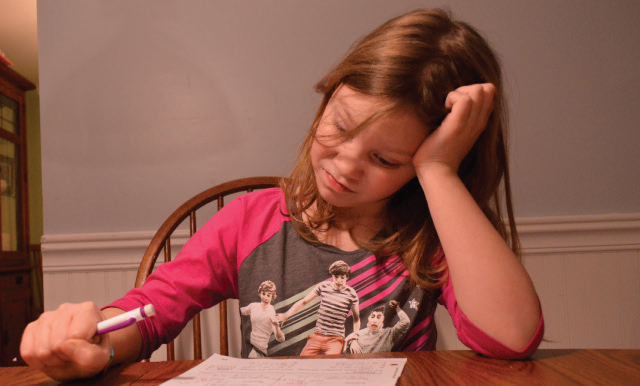Common Core “Robotizes” education, minimizes innovation

A frustrated second grader struggles with complicated new math problems.
ACT. AP. SAT. These are the abbreviations that strike fear and stress into the hearts of many. Most students remain unaware that a new, unfamiliar type of testing will be added to the mix due to the Common Core State Standards Initiative. The ultimate goal of Common Core is to maintain consistent curriculum across the United States and increase students’ college preparedness through the use of standardized goals and testing.
The truth is, Common Core is not new. So far, 45 states have adopted Common Core curriculum, including Michigan back in 2010. Full implementation of Common Core occurred during the 2012-2013 school year, and as change seems to be seeping into our school system, education is transforming… possibly for the worst.
It’s “elementary”
While Common Core is designed to affect grades K-12, changes, particularly at the elementary school level, have been most noticeable in the Rochester school district. While our elementary school counterparts have little to no understanding of “Common Core,” they are unknowingly stepping into a new type of curriculum that is changing the face of education as we know it.
For example, elementary schools students in the Rochester school district now use updated math workbooks with the “Common Core” stamp of approval.
This is a third-grade math problem reportedly from Common Core curriculum:
Add 26 + 17 by breaking apart numbers to make a ten.
Use a number that adds with the 6 in 26 to make a 10. Since 6 + 4 = 10, use 4.
Think: 17 = 4 + 13
Add 26 + 4 = 30
Add 30 + 13 = 43
So, 26 + 17 =43
This bizarrely-worded math problem has the power to stump older students and adults alike. While one expects elementary school education to be exactly that, “elementary,” the Common Core problem sets are not. Focusing on breaking up numbers into 10’s and 1’s, they are highly obscure and, frankly, quite ridiculous. According to CNN, child psychologists and experienced educators have never sufficiently tested Common Core curriculum. Also, the standards were never even field-tested.
Common Core curriculum encourages teachers to use scripts, which are included in curriculum module booklets. These scripts not only outline lesson plans, but give teachers exact sample dialogue that can be said during class. Here is an excerpt from the “Common Core New York State” mathematics curriculum module for a second-grade class:
Students are seated in a U shape or circle on the carpet. Quite dramatically empty the contents of the box onto the carpet.
T: Students, let’s count these straws! About how many do you think there might be? Discuss your ideas with your partner.
T: (After listening in for a few minutes.) Let’s see how many there really are.
T: How can we count them efficiently so that we can get to recess on time?
These script modules consist of pages and pages of theoretical dialogue that sounds not only eerily controlling, but also robotic.
While Michigan is in the process of implementing Common Core testing, other states’ test results show that Common Core tests are hard, confusing, and problem-causing. According to The Daily Caller, Common Core standardized tests are causing stress, so much so that, in New York, one school has reported students vomiting and wetting themselves during a testing period.
An abysmally low 31% of New York students in grades third through eighth passed or exceeded the new tests.
Not only are these tests showing poor results, but they are causing a heartbreaking amount of anxiety for young children.
Common Core and High School Students
While Common Core is transforming elementary school curriculum, high school is also expected to experience changes.
According to the College Board website, College Board has been affiliated with Common Core since the beginning, meaning that AP classes and testing will most likely go unchanged.
However, while some classes may seem unchanged, the introduction of Common Core testing is expected in the next couple of years. This means that not only will the Rochester Community Schools district be subjected to elementary school testing, but also some form of high school Common Core testing as well.
The Problem with Common Core
When tests are involved in education, there seems to be a constant urge to, rather than just learn material for the sake of learning, learn solely for test achievement. As writer John Steinbeck once said, “I have come to believe that a great teacher is a great artist and that there are as few as there are any other great artists. Teaching might even be the greatest of the arts since the medium is the human mind and spirit.”
If a teacher is truly an artist, than Common Core is replacing the passion of teachers with scripts and student enthusiasm with test anxiety. America is a country that prides itself in stemming from its own innovation and freedom, but yet, innovation in classrooms is becoming stifled in favor of the conformity and mechanicalism of standardized testing. For an initiative that strives to create an “all-American,” “across the board” educational curriculum for the United States, Common Core seems to be doing all the wrong things.





